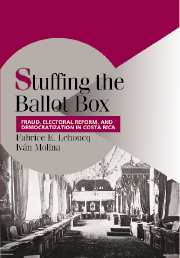Book contents
- Frontmatter
- Contents
- List of Tables and Figures
- Preface
- INTRODUCTION
- 1 ELECTORAL FRAUD DURING INDIRECT AND PUBLIC ELECTIONS, 1901–12
- 2 INSTITUTIONAL CHANGE, ELECTORAL CYCLES, AND PARTISANSHIP, 1910–4
- 3 ELECTORAL FRAUD DURING THE PUBLIC BALLOT,1913–23
- 4 INSTITUTIONAL CHANGE, ELECTORAL CYCLES, AND PARTISANSHIP, 1924–8
- 5 ELECTORAL FRAUD DURING THE SECRET BALLOT, 1925–48
- 6 POLITICAL POLARIZATION, ELECTORAL REFORM, AND CIVIL WAR, 1946–9
- CONCLUSION: BALLOT-RIGGING AND ELECTORAL REFORM IN COMPARATIVE PERSPECTIVE
- Index
- Cambridge Cultural Social Studies
INTRODUCTION
Published online by Cambridge University Press: 16 July 2009
- Frontmatter
- Contents
- List of Tables and Figures
- Preface
- INTRODUCTION
- 1 ELECTORAL FRAUD DURING INDIRECT AND PUBLIC ELECTIONS, 1901–12
- 2 INSTITUTIONAL CHANGE, ELECTORAL CYCLES, AND PARTISANSHIP, 1910–4
- 3 ELECTORAL FRAUD DURING THE PUBLIC BALLOT,1913–23
- 4 INSTITUTIONAL CHANGE, ELECTORAL CYCLES, AND PARTISANSHIP, 1924–8
- 5 ELECTORAL FRAUD DURING THE SECRET BALLOT, 1925–48
- 6 POLITICAL POLARIZATION, ELECTORAL REFORM, AND CIVIL WAR, 1946–9
- CONCLUSION: BALLOT-RIGGING AND ELECTORAL REFORM IN COMPARATIVE PERSPECTIVE
- Index
- Cambridge Cultural Social Studies
Summary
Central Questions
Why do politicians reform the institutions that keep them in power? Why do they relinquish the ability to rig electoral results? The nonfraudulent 2000 Yugoslavian elections triggered the collapse of President Slobodan Milosevic's nationalist regime. The fairness of the 2000 elections in Mexico signaled the end of the PRI's sixty-year stranglehold on the presidency. Yet, for every occasion when dictators respect the results of the ballot box, there are many examples of regimes that rig elections in their favor. Why incumbents would consent to having – and respecting the outcomes of – fair elections, however, is far from clear.
This book explains the development of fair electoral practices in Costa Rica to shed light on the politics of institutional reform. As in Chile, England, Sweden, and Uruguay, politicians in nineteenth century Costa Rica gradually transformed a competitive but fraud-ridden republic into a modern democracy – one that, since 1949, has held regularly scheduled, fair elections and where every adult is entitled to vote. Party politics took off in 1889, when the incumbent liberals, under pressure of a popular uprising, reluctantly ceded power to an opposition liberal-clerical alliance. Since the turn of the century, politics became increasingly competitive even as presidents and their opponents did not stop using fraud and violence to shape election results. Indeed, the widespread use of fraud often threatened to snowball into armed confrontations between government and opposition forces.
- Type
- Chapter
- Information
- Stuffing the Ballot BoxFraud, Electoral Reform, and Democratization in Costa Rica, pp. 1 - 33Publisher: Cambridge University PressPrint publication year: 2002



